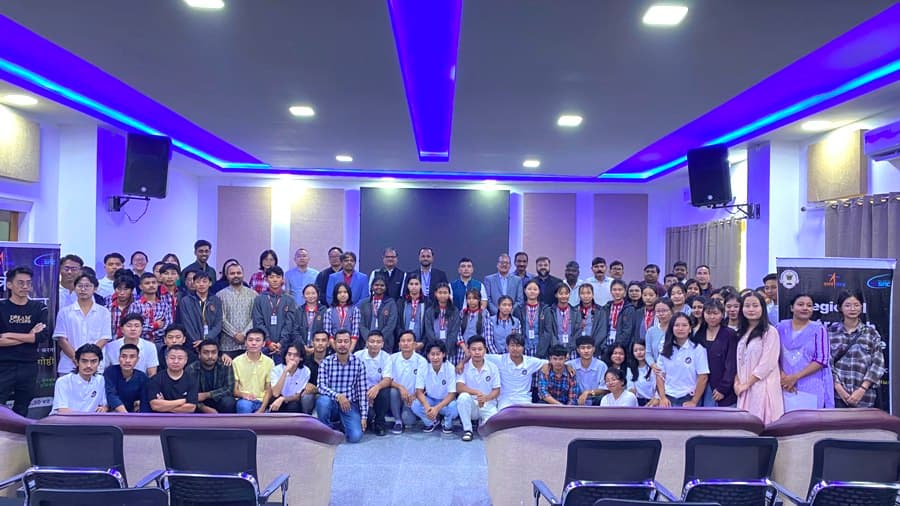Nagaland University’s Lumami outreach event urged students to pursue space research careers ahead of the National Space Science Symposium 2026.
Share

DIMAPUR — Nagaland University hosted a Regional Outreach Programme on ‘Igniting young minds through science and space’ at Lumami on November 7, as a precursor to the National Space Science Symposium (NSSS) 2026.
The symposium, jointly initiated by the Indian Space Research Organisation (ISRO), Bangalore, and the North Eastern Space Applications Centre (NESAC), Umiam, Meghalaya, will be held in February 2026 at NESAC, Umiam, Meghalaya, according to an update.
Dr. Himanshu Pandey, web information manager (WIM), ISTRAC, and division head, Indian Space Science Data Centre (ISSDC), ISRO Bangalore, attended as the guest of honour and encouraged students to explore career opportunities in space research while highlighting ISRO’s pivotal role in empowering young talent.
The chief guest, Jagadish K Patnaik, vice chancellor of Nagaland University, recounted the journey of Bodhisattwa Sanghapriya, founder of IG Drones, whose achievements during Operation Sindoor showcased the transformative power of student innovation from Odisha to the national stage.
The programme featured two technical sessions. Dr. Pandey delivered an overview on the evolution of India’s space programme, major space centres, and planetary exploration missions, while Dr. Arup Borogohain detailed the societal benefits of space technology, including satellite navigation, space-based support for disaster management, agritech applications, and analytics for geotourism.
Read more local news: St. Joseph’s College (A) hosts state-level Mathematics quiz competition
Seminar on education and social responsibilities
Meanwhile, the Department of Education, Nagaland University, organised a one-day seminar for research scholars and educationists on the theme “Education and social responsibilities” at its premises on November 6.
An update mentioned that altogether, 95 participants from within and outside Nagaland attended the seminar.
In her opening remarks, the head of the department, Lungsang Zeliang, dwelt on the conceptualisation of the seminar as a reminder of the importance of education being closely linked to society and the need to understand changes in higher education with the NEP 2020.
Speaking at the inaugural session, Dr. Zavise Rume, director of International University, Nagaland, stressed the need to create a knowledge society through academic programmes. Sharing that the ethos of Naga practices can be utilised, Dr. Rume commended the involvement of local community leaders, artisans, and experts in education and called for integrating indigenous knowledge with modern technologies, asserting that both can co-exist and strengthen one another.
The resource person of the first session, Buno Liegise, dwelling on the features of NEP 2020, which seeks to make higher education multidisciplinary, holistic, transformative, and futuristic, she stated that Nagaland University has taken early initiatives for implementing NEP 2020 through the introduction of multidisciplinary higher education, the Four-Year Undergraduate Programme (FYUGP), and vocational-based courses.
She highlighted that social responsibility means individuals and institutions must act to benefit their environment and society and called upon all present to be brand ambassadors of their education by giving back to society, sharing knowledge and skills, and developing 21st-century competencies.
The second session featured Narola Chuba, assistant professor, Department of Education, as the resource person. She focused mainly on the issues and challenges of FYUGP, including its advantages. The house deliberated on challenges such as implementing the multidisciplinary aspect, the Multiple Entry and Exit System (MEES), internships, and the increased workload of teachers.
Despite its challenges, Chuba highlighted the positive aspects of FYUGP, including enhancing student choice and autonomy through flexible course structures, bridging the gap between theoretical knowledge and practical skills, improving career readiness, and fostering deeper learning and skill development over a four-year period.